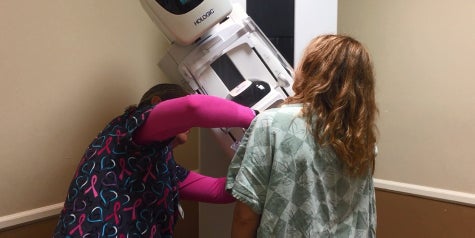Mammogram: Five Things to Expect

The unknown can make us fearful, even a 15 minute screening that can help save lives. October is Breast Cancer Awareness month, and researchers report that 1 in 8 women are expected to have breast cancer in a lifetime. That’s why early detection and breast screenings are important. A mammogram, or X-ray of the breast, is the most common screening that health providers use to detect any breast abnormalities or concerns.
Baptist Health Care’s Women’s Imaging recently welcomed a new patient who had her first mammogram at age 40.
Here are five helpful takeaways from the patient and from Baptist Women's Imaging:
1. Select the facility where you’d like to have your mammogram. Plan to continue services there for a baseline and accurate screening results. At Baptist Women’s Imaging, mammogram results will be sent to the patient and to the patient's doctor who can go over specific details and answer questions the patient may have.
2. Be relaxed and as natural as possible prior to the mammogram. You can skip wearing deodorant and lotions that day. Because you’ll need to remove your top to put on a gown, wear a skirt, pants or shorts so you can be covered from the waist down. Then you can more easily open the gown top during the exam.
3. The screening process is quick. The entire mammogram takes less than 15 minutes in most cases. In fact, the undressing and paperwork take longer than the mammogram itself. A typical mammogram takes four digital photos of each breast, and each photo is captured in a matter of seconds.
4. The mammogram machine compresses or squeezes the breast to help flatten it to take precise breast tissue pictures. The process may be uncomfortable, but it should not be painful. Each year, as technology improves, the mammogram machines that perform the screenings are more accurate and cause less discomfort. Years ago when our grandmothers had screenings, it may have been painful, but that’s not the case in most mammograms today.
5. Remember your reason for having the mammogram. Whether it’s to gain peace of mind, establish a baseline or alleviate a concern, you are taking control of your health. Keep that in mind as you face any potential discomfort or worries. When you understand your body, you can be more informed and empowered to make decisions.
“In most cases there is nothing of concern,” said Vikki Jordan, senior manager of imaging services at Gulf Breeze Hospital and Baptist medical parks. “If we do see something on the mammogram results that is not what we are expecting, then we will call the patient and discuss additional mammogram pictures or a breast ultrasound.
“The earlier we are able to detect a mass or other issue in breast health, the quicker we can determine proper treatment for a greater success rate,” said Jordan.
Being proactive in breast health is vital. Don’t let fears prevent you from an active, enjoyable life. Visit ebaptisthealthcare.org to schedule your mammogram today.

